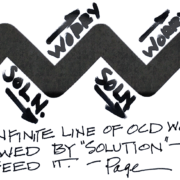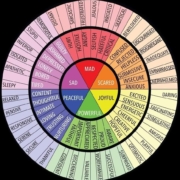Managing intense emotions is tough. And if you live with someone that constantly worries about everything, and constantly seeks reassurance, you may wonder “How do you help a reassurance junkie?” You know what it is like to experience their anxiety.
Posts
Worry as a way to problem solve feels useful. Big hint: It isn’t. How to stop worrying becomes more doable when you think of it as spam. The worry thoughts pop instantly into your inbox, aka brain, with catchy titles and tantalizing “solutions.” Of course you supply those solutions, which allows a new email to pop up! Yay! Another problem to “solve” and you’re off to the races. It actually could be conceived as looking like a zig zag pattern in your mind. You go up with a problem, down with a “solution” so it feels like you are accomplishing something with the “action” of worry. And that zig zag can be infinite.
Is it narcissism or confabulation? It can be a difficult to tell these two apart as distinguishing sarcasm and “humorously delivered” criticism. Is a person deliberately lying when they confabulate? Here’s a quick definition of confabulate.
In the formal version, confabulate means to talk, with roots found in the words ‘fable’ and ‘fabulous.’ In the world of psychiatry, it means to fabricate imaginary experiences as compensation for loss of memory. This is common in alcohol induced dementias aka Korsakoff syndrome (a type of dementia often associated with alcohol abuse), but it also has been observed in cases of Alzheimer’s disease and frontotemporal dementia.
I thought that today would be a good one to round up a few simple facts about feelings, so here goes. This image is a feelings wheel that can expand your emotional vocabulary. The purpose of feelings and emotions is to get you to act. However, sometimes we don’t choose the best course of action.
Word. This is the number one anxiety related sleep issue I hear about: “I wake up and can’t get back to sleep.” That is closely followed by: “I can’t get my monkey mind to stop at night when I am trying to get to sleep.” I am going to help you with both issues. It’s up to you to actually implement the help. Horses, water, drink…well you know the drill.
First we are going to get the blah, blah, blah, sleep hygiene talk out of the way. You have heard it all before, BECAUSE IT’S IMPORTANT, duh. If you can’t get these principles under wraps, you may as well stop here, even if I am going to give you some mostly secret knowledge later on.
The Speed Of Want is a chapter title I read in the recent (great) book by therapist Lori Gottlieb Maybe You Should Talk To Someone (Houghton Mifflin Harcourt, 2019). In it she alludes to what I think of as the human evolutionary trait of finding faster, easier ways to the goal, with none or less of the hard work necessary to accomplish it. Witness the recent college admissions cheating scandal. In modern times, think of the changes that have occurred simply between the start of the industrial age and the present that have impacted our lives with mass production, instant worldwide communication, and outsourced labor due to advanced robotics alone.
But there are unintended consequences to this ‘need for speed.’
What better time than the start of a new year to make change that can positively affect the rest of your life? Let’s assume you have made that brave decision, and talk therapy is part of your plan. What do you expect when you are expecting talk therapy? If you want to know how I do it, read on.
People that have never experienced talk therapy often feel a tad apprehensive about getting started. There are lots of reasons. Some wonder if it will do any good at all, and others have the odd fear they won’t be able to ‘do it right.’ Some people simply don’t know how it proceeds or what is expected of them, and they are anxious about that. Still others believe they will receive all the instructions from the therapist about how to change and be on their way—with no real understanding of the courage, persistence, and work that real change takes. And some believe a pill is the answer.
Most therapists who treat anxiety disorders will teach you breath work. They also call it diaphragmatic breathing or belly breathing. But I don’t think that many teach you why this is so important in managing anxiety.
Why does the why matter? Because if you understand a little more about the positive effect this can have on your body during panic and anxiety, you are more likely to use it.
There are three solid reasons to do breath work.
I use hypnosis in treatment when the client agrees it will be helpful. It is part of the sessions, not the entire content. In order to learn hypnosis, I trained specifically with different instructors who teach different methods. In this way I developed my own style. And I don’t care what you call hypnosis: mediation, guided imagery, or hocus-pocus, it works. When you focus with hypnosis, you are quieting and stilling the mind with a gentleness that allows the solutions already within you to surface.
I am waiting to return safely to my home in Wilmington, North Carolina. We are currently cut off by flood waters. My husband and I evacuated from Hurricane Florence and the destruction it left behind. While I wait, I am reading the book Grit (2016) by Angela Duckworth. She is a psychologist and researcher at University of Pennsylvania who studies achievement, and has a TED Talk you may wish to hear on the subject of grit. It’s been on my list for a while, and this seemed like a fairly pointed time to dive in.
Grit sounds self explanatory, but if you think you have it, you may be engaging in oversimplification. I expect many who find themselves cleaning up and rebuilding in the aftermath of the horrific destruction by Florence are going to experience either its lack, or its presence, in their lives.
PAGE RUTLEDGE, LCSW, CHt | Couples Counseling
Tel: 910-777-7243
Offices at:
5006 Randall Parkway (close to UNCW)
Wilmington, NC 28403
Free parking at office










